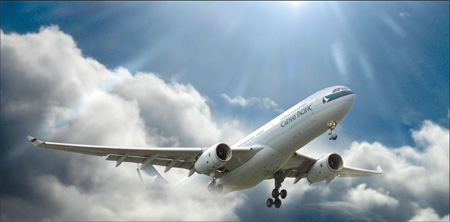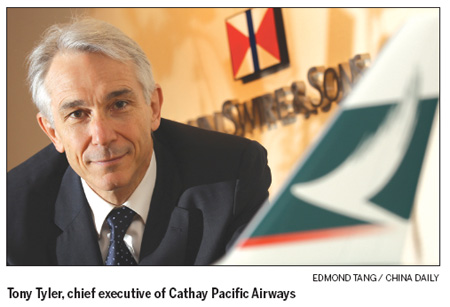Aiming beyond the clouds
Updated: 2010-03-26 07:37
By Joey Kwok(HK Edition)
|
|||||||||

Cathay's Tyler aims for expansion, despite difficult year ahead
Despite the recent pickup in global economic activity, Cathay Pacific Airways has said the airline market remains challenging in 2010, owing to intensive competition in the airline industry.
In an exclusive interview with China Daily, Cathay's chief executive Tony Tyler said the global airline industry is "a mess", at present, especially in view of an ongoing weakness in economic conditions.
"It's likely to remain very difficult to operate because it's a very fragmented business," Tyler said.
He added that the industry, consisting of over 250 airlines worldwide, is a highly competitive industry, and international airlines are encountering more challenges to expansion, as routes often are restricted to airlines of the particular countries.
"Even in the good times it's difficult. When a global financial crisis comes along and recession hits, it's terrible," Tyler noted.


Global airline industries suffered their worst year ever in 2009, as the economic recession whittled down passenger and cargo demand.
Revenue at Cathay, the biggest carrier in Hong Kong, slumped 23 percent to HK$67 billion last year. The airline's overall passenger numbers dropped 1.6 percent to 24.56 million, with passenger yield, a measurement of average sales, falling 19.5 percent.
Cargo volumes for Cathay and its subsidiary Dragonair slid 7.1 percent to around 1.53 million tons, while cargo yield was trimmed to 26.8 percent.
Cathay, also the fifth largest airline in Asia, said passenger demand for premium seats, which accounts for a high proportion of total revenues, has been particularly hard-hit by the economic downturn.
According to the International Air Transport Association (IATA), the global recession has wiped out six years of premium travel growth. Although economy class bookings are nearing early 2008 peak levels, business traffic is still 17 percent below, the IATA said.
Tyler said premium passenger numbers on board Cathay this year will depend very much on "the strength of the world's economy, especially the economic growth in China".
He added that most of Cathay's premium travel at present is driven by the financial sector. If financial services activity is robust and more companies are doing initial public offerings and other fund-raising activities, premium travel between Hong Kong and different major financial centers around the world will increase.
Despite the economic uncertainties, Tyler also expects the airline's overall operations to perform better in 2010.
"If the world's economy continues its slow recovery, and fuel prices remain at the current level, we should see a better year this year," he said.
Fuel prices, in fact, have been a major concern of Cathay and many other airlines around the world, as they have a significant impact on the carrier's profits.
To reduce exposure to the fuel price risk, airlines usually embrace a combination of fuel derivatives to achieve their desired hedging position.
Benefiting from the fuel-hedging gains, Cathay reported HK$4.69 billion in net earnings in 2009, despite declines in both passenger and cargo demand amid the recession.
Tyler said current fuel prices, of around $81 per barrel, are quite high by historical standards. However, he added that the airline's fuel-hedging contracts are good enough to protect the company against the high prices.
"The current (fuel) prices are quite high. Clearly, it's affecting our profitability. But the hedging position of our company at the moment is reasonably good this year and reasonably well-protected against any price rise from the current level," he noted.
According to Cathay's fuel-derivatives contracts, if the fuel price in 2010 and 2011 is around $80 per barrel, there will be no further net cash impact and mark-to-market losses incurred.
However, if the fuel price is at about $40 per barrel in the next two years, the company would be required to pay a total of around $850 million to settle contracts.
The volatile fuel prices have plunged earnings of many global airlines into the red. A sudden fall in fuel prices in the second half of 2008 caused Cathay to record a HK$7.6 billion paper loss from its fuel-hedging contracts, ending the year with a HK$8.56 billion net loss. Tyler said the company did not expect the fuel price to go up so fast, then to collapse suddenly in 2008.
Facing the challenging operating environment, Cathay last year implemented several cost-saving measures to reduce capital expenditures, including delaying the construction of a new air cargo terminal in Hong Kong for two years, to 2013.
Cathay, meanwhile, cut its airline capacity by 8 percent last year, with much greater reduction on the cargo side, while suspending several routes that were unprofitable, to cut costs.
In an effort to cut costs even further, the airline also implemented unpaid leave for employees last year, with senior staff asked to bear the heaviest load.
As the airline reported better than expected earnings in 2009, management decided to make a special ex-gratia payment to staff who have taken unpaid leave.
"I believe strongly that if you are in trouble, you need to ask help from the staff. But if the company does better than expected, you should reward and say thank you to them," Tyler said.
Amid the difficult economic conditions, Cathay has had a hiring freeze in effect over the past 18 months. Tyler said the company will have quite modest growth in staff numbers this year, particularly among front-line operating crewss.
"I expect that we will be hiring some staff, as we add back services we have suspended before," Tyler said.
He added that the airline will need more staff to support its growth in the coming years, especially when it expects some recovery and expansion in business in 2010 and 2011.
As the global economy gradually accelerates its recovery, Cathay plans to seize the opportunity to plan for its future expansion.
Tyler said the airline currently has new destinations on its radar screen. For example, Cathay will launch direct flights to Milan by the end of March.
"We are looking at places in the Middle East, North America, Southeast Asia and several cities on the mainland," Tyler said.
He added that the new destinations will improve the company's profitability, while enhancing the traffic network in Hong Kong, as the city develops itself as an international air hub.
(HK Edition 03/26/2010 page2)